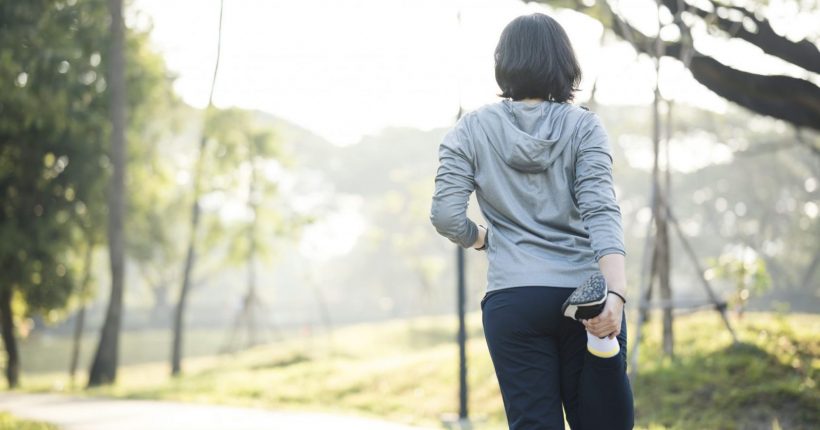New research suggests that there’s a super-simple way of telling how healthy you are or will be in a few years time – and you can do it brushing your teeth, boiling the kettle or making a smoothie…
We all want to be fit and healthy for years to come – but how can we tell if we’re going to be mobile at 80 or unable to run by 60? Well, health experts believe that being able to balance on one leg is a pretty good indicator.
In fact, new research has found that if you’re not able to stand on one leg for at least 10 seconds without wobbling, your health probably isn’t that good. The 12-year study, published in the British Journal of Sports Medicine, claims that 50-somethings have almost twice the risk of dying within 10 years than those who can stand serenely on one leg.
That’s why, over the past few years, I’ve kept to one, simple fitness resolution: as well as vowing to run regularly, I brush my teeth while standing on one foot. Twice a day, I stand on my right foot to brush my lower set and then switch to my left to scrub the uppers.
You may also like
Having abs isn’t a healthy goal, according to an ex-athlete. This is why she thinks balance is better
After 18 months of balancing, I can’t conceive of brushing my teeth on two feet. I’ve tried switching up my routine to do squats or calf raises while brushing but inevitably give up and return to my balance position. The reason I do it? I’m trying to increase my lifespan.
That 12-year study isn’t the first to conclude that how well we balance is linked to our overall health. Researchers have been banging on and on about balance as being one of the key indicators of long-term health and mortality for years. A 2014 study found that struggling to stand on one leg for less than 20 seconds was linked to an increased risk of stroke and reduced cognitive function in otherwise healthy people.
More recently, research published last year in the Journal of Orthopaedic Science looked at how being able to balance on one leg could predict whether people would suffer a potentially debilitating fall later in life.
Falls, the authors said, “are a primary cause of physical disability in older adults” – something that anyone with elderly relatives who’ve broken their hips (or worse) after missing their step will know only too well. Looking at middle aged and elderly Japanese adults, they found conclusively that someone’s ability (or not) to stand on one leg was predictive of falling, even after factoring in previous falls and other variables.
So, what does all of this have to do with those of us who are in the prime of our lives? As a runner, I’m concerned about balance because I want to avoid leaning too much to one side and being more lopsided than I already am.
A strong core is the key to running well, while equally firing glutes can stop you from picking up knee injuries and rolled ankles. While strength training and things like pilates are invaluable for making me a stronger runner, I’m sure that standing on one foot has also helped.
What happens when you stand on one foot?
When you stand for a minute on one foot, that leg does a lot of work (with or without the added balance test of a moving arm and toothbrush). Your toes have to spread and hunker down, your bridge starts to activate (which is great if you’re flat footed like me), your calf muscles work to support your ankle, the quad locks in and the glutes on that side have to work to stop you from sinking into your hip socket.
My balance wasn’t bad before 2021 but I found myself really having to concentrate on a spot to stay upright. Today, I can stay still and be on my phone with one hand and be brushing with the other. My stability is so honed that I can do leg lifts with my elevated leg without falling over. I’m better too at things like single leg deadlifts – meaning that I’m able to lift more during circuits at the gym.
Wobbling is totally normal – but you need to work towards standing still
In a piece she wrote for The Conversation, Dawn Skelton, professor in ageing and health at Glasgow Caledonian University pointed to that fact that our bodies, when standing up, are “inherently unstable”. Skelton explains that we have quite a small support relative to our height and width, and that, while the fitter you are, the more likely it is that you have good balance, it’s our nervous systems that control balance.
Once we’ve processed information from our balance senses (eyes, inner ears, muscle feedback), we then engage muscles in the feet, ankles, leg and core to adjust our position.
It’s worth noting, however, that the new study mentions wobbling within 10 seconds being a bad sign. So, while it’s normal to wobble if you’re standing for 15, 20 or 30 seconds, you really do want to work on being able to stand stock-still for 10.
Even if you’re not that active right now, you can still start to improve your balance and you’ll find that doing so will help with everyday activity. So, ready to start brushing on one leg?
Ready to put your balance to the test? Try one of our bodyweight workouts which will help to work on your core strength.
Images: Getty
Source: Read Full Article
